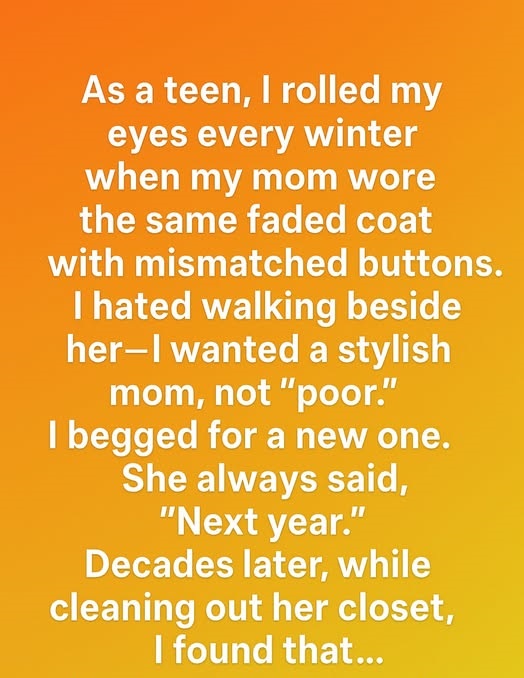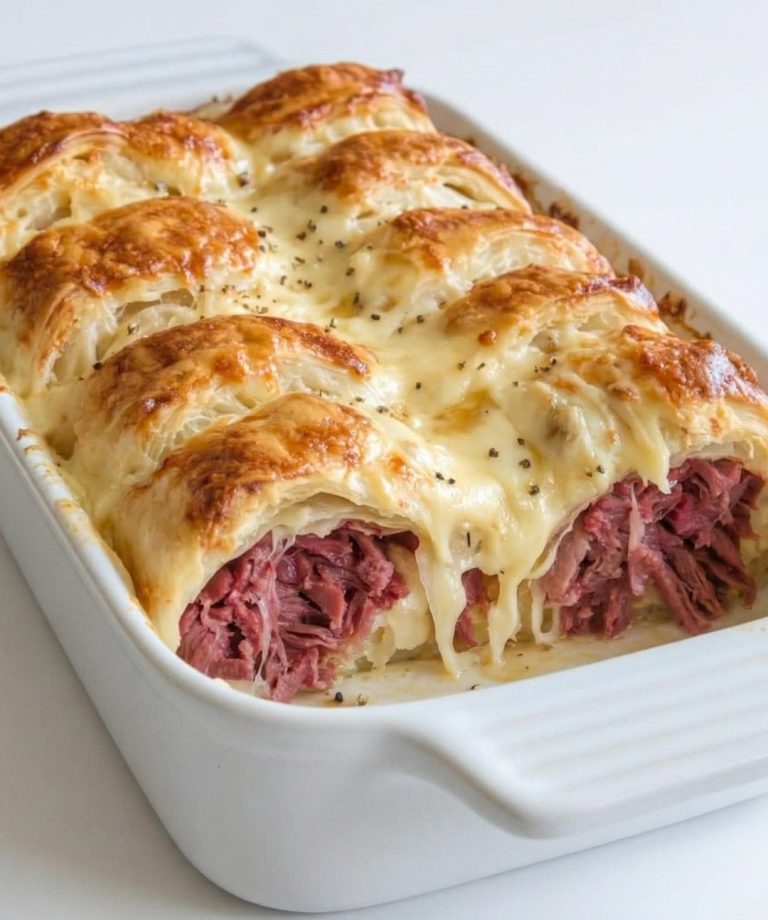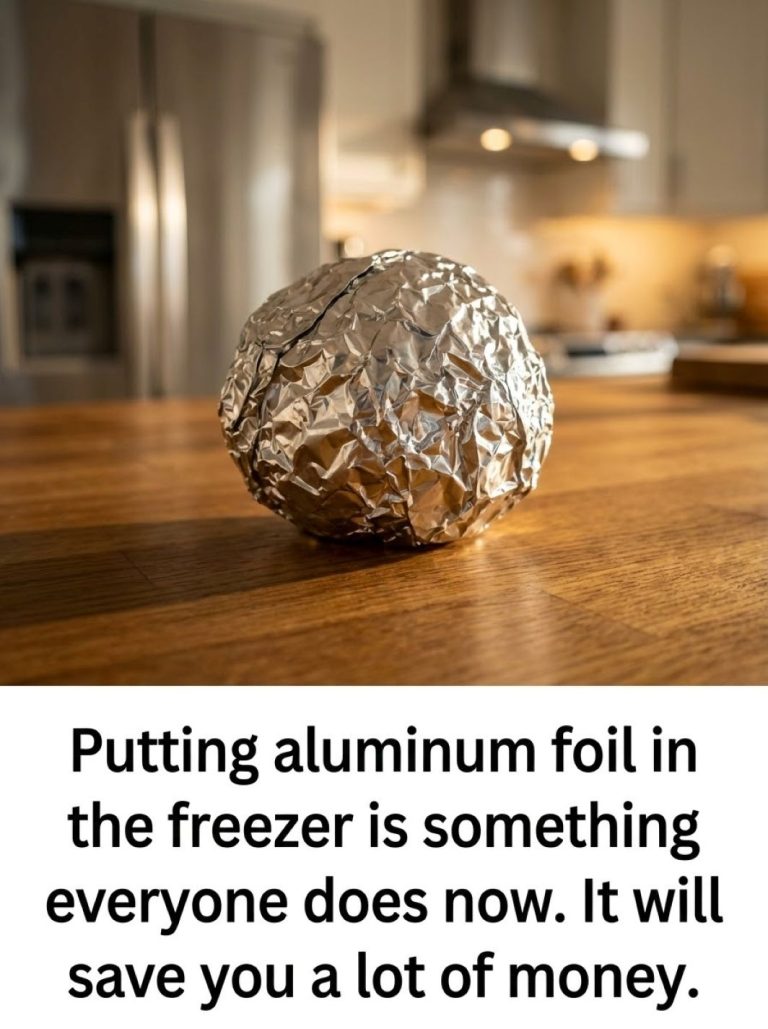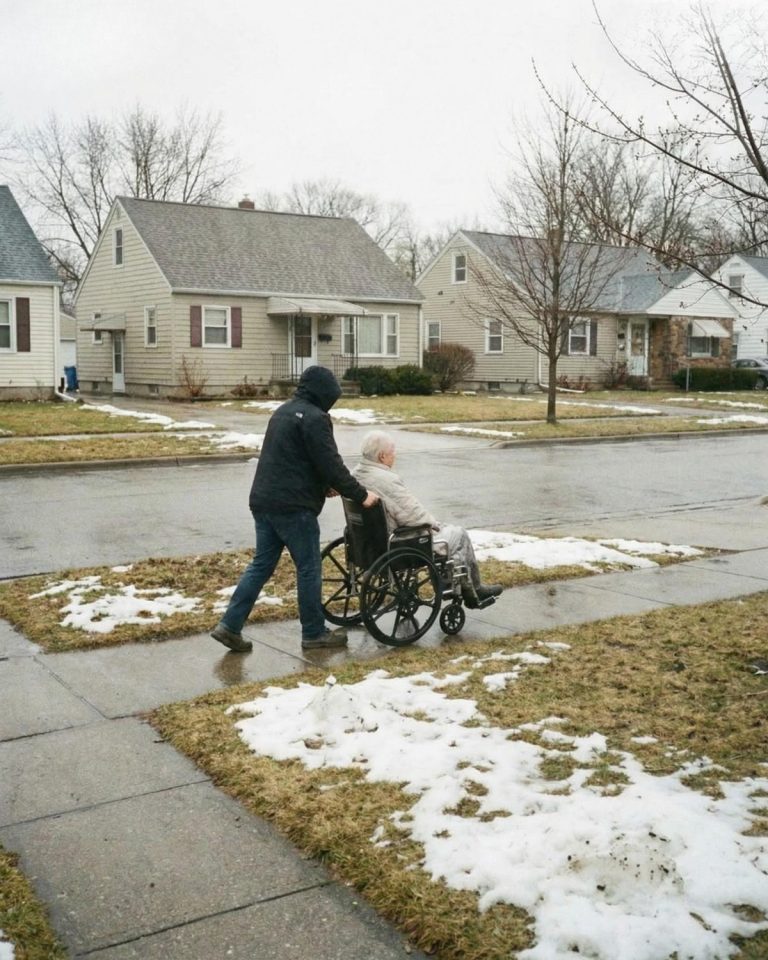
As a teen, I rolled my eyes every winter when my mom wore the same faded coat with mismatched buttons.
I hated walking beside her—I wanted a stylish mom, not a “poor” one.
I begged her for a new coat, embarrassed by how she looked next to the other moms at school.
She always said softly, “Next year, honey. We’ll get one next year.”
But “next year” never came.
I didn’t understand it then, of course. I was too wrapped up in my own teenage pride, too worried about appearances to see the truth that hid beneath that old, worn fabric.
Years later, after my mother passed away, I found myself back in my childhood home, cleaning out her things. The air smelled faintly of her perfume—lavender and something floral I could never quite name.
When I reached the back of her closet, there it was.
The coat.
The same faded brown wool, still holding its shape after all those winters. The same mismatched buttons—one white, one black, one shaped like a tiny heart. I ran my fingers over them, and memories came flooding back: her smile as she bundled me up for school, the way she’d pull that coat tighter against the wind as she hurried to catch the bus for work.
I lifted it off the hanger, and something slipped out of one of the pockets.
A small envelope, yellowed with age. My name was written on it in her careful, looping handwriting.
My heart pounded as I unfolded the paper inside.
“My darling,” it began.
“If you’re reading this, it means I’m gone. There’s something you never knew about this coat.”
I sat down on the edge of her bed, trembling, as I kept reading.
“You always wanted me to buy a new one, but every time I thought about it, I looked at the numbers in my checkbook and realized I couldn’t. The money I might have spent on myself always went to you. The school trips, the birthday presents, the sneakers you loved. That coat stayed with me so you could have what I didn’t.”
My vision blurred as tears filled my eyes. I could almost hear her voice saying those words.
“Each button on this coat came from something I had to fix—an old sweater, your baby blanket, one from your father’s shirt before he left. They reminded me that no matter what I lost, I still had you. That was enough.”
I pressed the paper against my chest, the sobs coming before I could stop them.
That “ugly” coat I’d once despised had been a patchwork of her sacrifices, her silent love stitched into every seam. Every mismatched button was a story—of a mother choosing her child’s comfort over her own dignity, her warmth over her vanity.
As I sat there in her quiet room, I realized how blind I’d been. How ungrateful. How foolish.
I had spent so many years wishing she’d been someone she wasn’t—someone who fit into the glossy mold of what I thought a mother should be.
But she had been more than that.
She had been real. Selfless. Enduring.
And she had loved me in the most extraordinary way—through every patch and stitch of that coat.
I couldn’t bring myself to throw it away.
Instead, I took it home.
I had it carefully cleaned and hung it in my own closet, right where I could see it every morning.
A few winters later, my daughter—five years old and full of energy—came running up to me as I reached for it.
“Mommy, that coat’s funny!” she giggled. “The buttons don’t match!”
I smiled through the lump rising in my throat.
“I know, sweetheart,” I said softly, kneeling beside her. “It’s very special to me.”
She tilted her head. “Why?”
I smoothed my hand over the worn fabric, feeling the faint ridges where my mother’s stitches once were.
“Because it reminds me that love doesn’t always look new,” I told her. “Sometimes it looks like something old that lasted long enough to keep you warm.”
That winter, I wore it often.
Not because I needed to. I could afford a new coat now. But because every time I slipped my arms into its sleeves, I felt my mother’s presence—steady, strong, and comforting.
The smell of wool, the faint creak of thread, the uneven buttons—all of it felt like home.
And one snowy evening, as I was walking my daughter home from school, she slipped her small hand into mine and said, “Mommy, I like your coat. It looks cozy.”
I smiled. “It is, baby. It really is.”
When we got home that night, I hung it by the door and caught my reflection in the mirror.
For the first time, I noticed something I hadn’t before—the way I stood, the tilt of my head, the quiet strength in my posture.
I saw her in me.
The teenage version of myself would’ve rolled her eyes. But the woman I’d become understood.
That old coat wasn’t a symbol of poverty—it was a badge of love.
And I finally realized that my mother had given me the greatest gift of all: not a stylish life, but a meaningful one.
Sometimes the things we’re ashamed of as kids become the things we treasure most when we grow up.
Because what I once saw as ugly was really beautiful.
And every winter since, I’ve worn that coat with pride—buttons and all.



